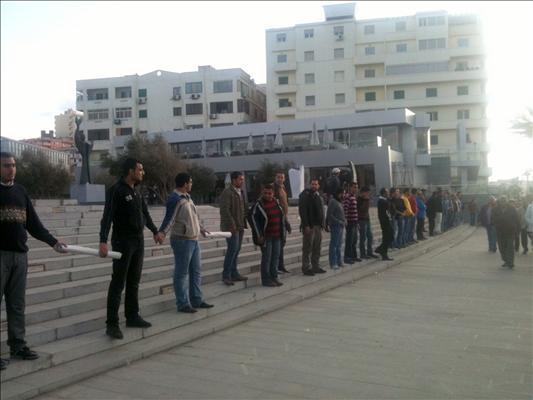Stewart Brand's Blog, page 107
February 21, 2011
The global brain
The Long News: stories that might still matter fifty, or a hundred, or ten thousand years from now.

Internet map of the Middle East
A computer defeats humans on a television game show. An information network brings down a series of dictatorships. We are witnessing a massive explosion in data, and an equally massive explosion in our ability to process and distribute it. The fall of the Soviet Union may have been driven, in part, by the fax machine; today, revolutions are driven by Wikileaks, Facebook, and Twitter. (You say you want a revolution? Google it.) Or, as Ken Jennings wrote on his monitor when he lost at Jeopardy to IBM's Watson: "I for one welcome our new computer overlords."
Some recent news articles about information overload — as well as some additional stories:
1. "A whopping 94% of global data is now stored digitally, up from 0.8% 25 years ago": As computer capacity soars, users drowning in data
2. It tripled in 2010: Worldwide mobile data traffic exploding
3. The Internet = us: World's total CPU power: one human brain
4. Or maybe, surpasses us: Robots replace teachers at 21 schools in South Korea
5. Meanwhile: maybe our energy problems are solvable: Today's clean tech could power the world by 2050
6. Unsettling news for climate change deniers and creationists: Global warming may reroute evolution
7. Shocking how many Americans don't believe in evolution (this time, it's the science teachers): Evolution still struggling in public schools
8. That's okay, we can rewrite evolution anyway: Mammoth 'could be reborn in four years'
We invite you to submit Long News story suggestions here.







February 18, 2011
Personal Digital Archiving Conference
If you plan to be in San Francisco next week, there is still time to register for the Personal Digital Archiving Conference. The conference is being held at the Internet Archive on February 24 & 25, 2011. The event blurb says it all:
From family photographs and personal papers to health and financial information, vital personal records are becoming digital. Creation and capture of new digital information has become a part of the daily routine for hundreds of millions of people. But what are the long-term prospects for this data? The combination of new capture devices (more than 1 billion camera phones will be sold in 2010) with the move from older forms of media is reshaping both our personal and collective memories. The size and complexity of personal collections growing, these collections are spread across different media (including film and paper!), and the lines between personal and professional, published and unpublished are being redrawn.
For individuals, institutions, investors, entrepreneurs, and funding agencies thinking about how best to address these issues, Personal Digital Archiving 2011 will include a variety of examples that may be replicated, and will clarify the technical, social, economic questions around personal archiving.
Long Now's Laura Welcher will be presenting "An Archive Model with Long Term Benefits" Thursday evening.
Check out the full, provisional schedule HERE. As you will see from this line-up, this is a wonderful opportunity to see and talk to the leading researchers in this area.
You can register HERE. [Deadline: February 24]
Travel and location information is on the conference website.







February 17, 2011
Library of Alexandria saved by the youth of Egypt
"The library is safe thanks to Egypt's youth"

The famous burning of the Library of Alexandria is still considered to be one the greatest losses of ancient culture. History tells us it was actually several events that eventually destroyed the library. Events similar to the ones we have witnessed over the last few weeks in Egypt. Recent losses at national libraries and museums in Serbia, Iraq, and now Cairo show that in times of upheaval, there is a strong desire to erase the past, and that past often resides in libraries. One of Long Now's board members is Mike Keller the head of Stanford libraries who has close ties with the modern Library at Alexanderia. We have all been waiting to hear how the library fared in the revolution, see the encouraging report below:
Stanford Libraries have a close collegial relationship with the new Library of Alexandria, known as the Bibliotheca Alexandrina, or BA. We have been anxiously watching the news of turmoil in Egypt with a particular concern about that inspiring institution (to say nothing of other cultural repositories, some of which were damaged in recent weeks). I am truly delighted and relieved to report that the BA is intact as of this writing. Indeed, some 50 volunteers formed a human cordon to protect and support it during mass demonstrations in its vicinity on the Corniche of that historic city. Even when all of Egypt was reportedly cut off from the Internet, the BA retained connectivity through its own international network, and its director, Dr. Ismail Seregeldin, was able to post several assuring messages to the BA's friends around the world, complete with
None of this predicts how the BA will fare hereafter. During the turmoil on the streets, one of the BA's senior staff closed a message to me as follows: "Pray for us." That may still be about all we can do. As momentous events unfold in a post-Mubarak Egypt, we will look for more tangible ways to express our support and solidarity.
As a parting thought: as implausible as mass insurrection seems here, if something somehow comparable were to happen, would we put ourselves on the line to protect our libraries as did the citizens of Alexandria?
Bravi!
Andrew Herkovic







February 16, 2011
How Much Does a Kilogram Weigh?

As a recent New York Times article observes, the kilogram is officially defined as "a unit of mass equal to the mass of the international prototype of the kilogram." Well, it turns out that the prototype, a chunk of platinum and iridium housed at the International Bureau of Weights and Measures in France, has lost a bit of weight since it was made in the 1880s. The builders of the prototype did their best to design for the long-term, choosing a 90% platinum / 10% iridium alloy for its corrosion resistance and good thermal properties, sheltering it with bell jars and a vault, and minimizing its surface area. Time, however, has proven their efforts insufficient. The New York Times points out that the method for standardizing the kilogram has been going out of style:
The kilogram is the last base unit of measurement to be expressed in terms of a manufactured artifact. (Its cousin, the international prototype of the meter, was retired from active duty in 1960, when scientists redefined the meter. They redefined it again in 1983; a meter is now officially "the length of the path traveled by light in a vacuum during a time interval of 1/299,792,458 of a second," for those who would like to try it at home.)
Scientists now have similarly bold plans for the kilogram, and indeed for several other base units of measure. A draft resolution to be considered at the General Conference of Weights and Measures in October includes new and improved definitions for the ampere, the mole and the candela.
"This would be the biggest change in metrology since the metric system was introduced during the French Revolution," Dr. Quinn said.
Which is all very exciting and very revolutionary. But it is easier said than done.
Indeed, we all take these standards for granted, but they are one of the things that allow us to build on the past and conceive into the future. Their definition may seem esoteric, but one only has to go to a gas station in a country without standards enforcement to see the potential pit falls of a lack of them. Moving into the future with standards not defined by physical items, the Bureau of Weights and Measures discusses some of the difficulties they face, such as the degree of uncertainty in Planck's constant, here on its website.







February 11, 2011
Long Now Media Update

LISTEN
(downloads tab)
Mary Catherine Bateson's "Live Longer, Think Longer"
There is new media available from our monthly series, the Seminars About Long-term Thinking. Stewart Brand's summaries and audio downloads or podcasts of the talks are free to the public; Long Now members can view HD video of the Seminars and comment on them.







February 10, 2011
Mary Catherine Bateson, "Live Longer, Think Longer"
Parenting Earth
A Summary by Stewart Brand
The birth of a first child is the most intense disruption that most adults experience. Suddenly the new parents have no sleep, no social life, no sex, and they have to keep up with a child that changes from week to week. "Two ignorant adults learn from the newborn how to be decent parents." Everything now has to be planned ahead, and the realization sinks in…
Read the rest of Stewart Brand's Summary here.







February 4, 2011
Long Quotes: Ralph Waldo Emerson
Quotes related to long-term thinking. Have a favorite quote? Share it with us in comments.
"Adopt the pace of nature: her secret is patience."
– Ralph Waldo Emerson







February 3, 2011
Political Foresight
Back in August of last year Long Now member Rony Kubat posited the following question to Stewart Brand at an MIT event:
What if The Long Now Foundation commissioned one of the reputable national polling agencies to tack on a couple of questions to a large national poll? Something along the lines of: "When considering major domestic/ international/ economic issues, I believe that my senator/ representative/ president should be thinking on a time horizon of…" Of course, ask various permutations.
There are a couple of possible results, but what I suspect is that most people will choose a time period far longer than the rhetoric that American politics seems to press. This would be both good ammunition for The Long Now Foundation to press the core ideas, but too, the public results of a reputable national polling organization has potential of reaching the focused audience of the decision-makers themselves. An opportunity to change the political gab of the last decade?
While Long Now doesn't have resources for commissioning national polls, Stewart forwarded this idea to the Long Now board and Esther Dyson offered to ask Mark Penn of Penn Schoen Berland if they might help. Mark agreed without hesitation, and within a couple weeks Amy Leveton at PSB had helped us refine some questions to be asked in October just before the national elections.
Below is the data and brief analysis. The answers were surprisingly distributed, the only consensus seemed to be that people do perceive politicians to think only as far as their current term. I would like to think that Rony's original supposition was true, however this data doesn't support it. I wonder if it is because these types of questions are so rarely asked, that people have not spent time thinking in these terms? I hope that we are able to follow up and get more data as time goes on. If you have good suggestions for questions to be asked in future polls, please add them in the comments below.
Political Foresight
On October 7-13, [02010] Penn Schoen Berland surveyed 1,002 people in the U.S. with a representative distribution of Americans and 225 Washington D.C. Elites. Margin of error is 3.1% and 6.53% respectively.
The General Population is divided on how far ahead politicians should consider in their decision making across domestic, international and economic issues with nearly equal amounts saying 4 – 24 years. Republicans are slightly more interested in a longer term vision than Democrats. And DC Elites are also more likely to see beyond an elected official's next two terms
In your opinion, when politicians consider major
domestic issues, how far ahead should they be thinking?
Gen Pop
DC Elites
Age 18 -34
Age 35 -54
Age 55 -74
Dem
Rep
Indy
The next 4 years
27
14
26
31
23
29
25
28
The next 8 years
29
34
31
25
31
33
30
22
The next 24 years
21
40
21
20
22
16
24
23
The next 100 or more years
12
11
12
13
12
12
11
15
Don't know
11
1
10
11
12
10
10
13
In your opinion, when politicians consider international issues, how far ahead should they be thinking?
Gen Pop
DC Elites
Age 18 -34
Age 35 -54
Age 55 -74
Dem
Rep
Indy
The next 4 years
25
11
25
26
24
28
21
27
The next 8 years
28
35
27
25
32
29
30
24
The next 24 years
22
34
24
22
21
19
27
20
The next 100 or more years
11
16
11
13
9
11
8
14
Don't know
14
3
13
14
14
14
13
15
In your opinion, when politicians consider economic
issues, how far ahead should they be thinking?
Gen Pop
DC Elites
Age 18 -34
Age 35 -54
Age 55 -74
Dem
Rep
Indy
The next 4 years
27
19
29
27
24
32
23
26
The next 8 years
28
34
25
28
30
30
30
24
The next 24 years
24
38
25
23
24
22
27
24
The next 100 or more years
12
9
12
13
11
8
14
16
Don't know
9
1
8
8
10
8
7
10
Most believe that politicians have a short-sighted focus and only account for their current term. Those in the Beltway feel this is true more than others
Q: When politicians consider these issues, how far ahead do you think they are actually thinking?
Gen Pop
DC Elites
Age 18 -34
Age 35 -54
Age 55 -74
Dem
Rep
Indy
The next 4 years
54
85
55
52
58
55
58
50
The next 8 years
13
3
13
12
12
14
14
9
The next 24 years
6
3
8
5
5
7
6
5
The next 100 or more years
4
1
6
4
1
4
3
5
Don't know
23
9
18
26
25
20
18
31
38







February 1, 2011
Long Now Media Update

WATCH
Philip K. Howard's "Fixing Broken Government"
There is new media available from our monthly series, the Seminars About Long-term Thinking. Stewart Brand's summaries and audio downloads or podcasts of the talks are free to the public; Long Now members can view HD video of the Seminars and comment on them.







January 24, 2011
Edge Question 02011
Published at the beginning of each year since 1998, the Edge.org Question is pondered by an assortment of scientists, cultural theorists and thinkers. Each responds with a short essay, maybe only a few paragraphs long. Last year, editor John Brockman posed the query, "How is the internet changing the way you think?"
This year, he asks:
James Flynn has defined "shorthand abstractions" (or "SHA's") as concepts drawn from science that have become part of the language and make people smarter by providing widely applicable templates ("market", "placebo", "random sample," "naturalistic fallacy," are a few of his examples). His idea is that the abstraction is available as a single cognitive chunk which can be used as an element in thinking and debate.
WHAT SCIENTIFIC CONCEPT WOULD IMPROVE EVERYBODY'S COGNITIVE TOOLKIT?
Several of the Long Now Foundation's Board Members were included in the published responses, as were a number of speakers in the monthly Seminars About Long-term Thinking.
Board Members:
Brian Eno
Stewart Brand
David Eagleman
Paul Saffo
Kevin Kelly
W. Daniel Hillis
SALT speakers:
J. Craig Venter
Martin Rees
Sam Harris
Clay Shirky
Juan Enriquez
Nassim Taleb
George Dyson
Matt Ridley ("Deep Optimism" – Scheduled – 3/22/11)
Carl Zimmer ("Viral Time" Scheduled – 6/7/11)







Stewart Brand's Blog
- Stewart Brand's profile
- 291 followers








